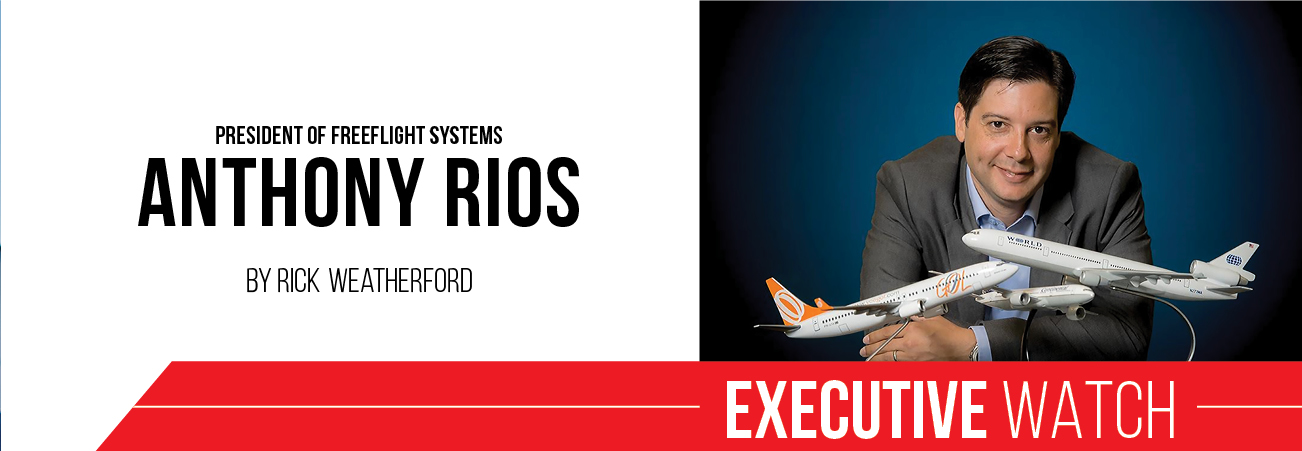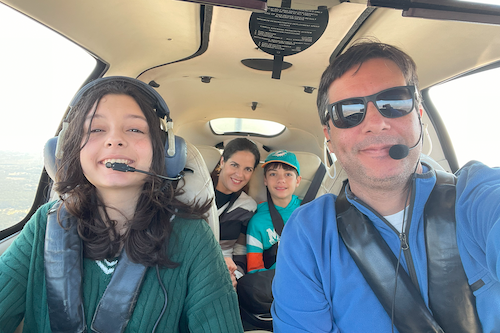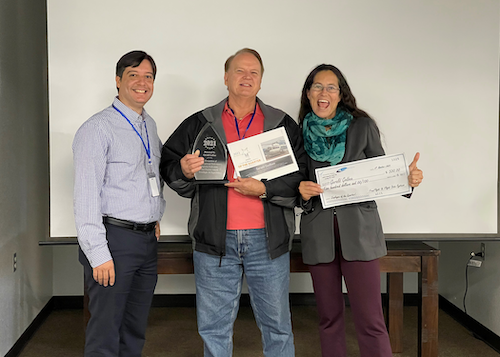|
Jun
28
2024
|
|
Posted 1 years 232 days ago ago by Admin
|
|

Conservative columnist George Will wrote:
“To immigrate is to make an entrepreneurial act. It’s to uproot yourself and maybe your family and take a risk.”
The youngest child of Cuban immigrants, Miami native Anthony Rios is proud of his Latin heritage and his parents’ entrepreneurial spirit. He says, “In South Florida, you strongly identify with your Latin roots; I come from a proud Latin family.” (Despite his Cuban roots, Rios doesn’t drink coffee or enjoy cigars. “I make up for that with rum,” he laughs.)
He recalls, “I grew up in an entrepreneurial home, not because it was popular being an entrepreneur, but because it was what was required to make life work.” His father began work in America as a mechanic at Firestone, but opportunities for promotion were limited for Latinos back in the 1960s. So, the family patriarch struck out on his own to open a service garage that he operated for 40 years. Rios’ mother left her waitressing job at a Latin restaurant to help run the garage. “That business put me and other relatives through private school and college, and I think that is a great story of my parents’ perseverance and work ethic,” Rios says with appreciation.
Career Takeoff
“I tell people that I didn't go looking for a job in aviation, but now I don't see myself doing anything else.”
Some of those garage profits went to Florida International University where Rios earned his bachelor’s degree in computer engineering. To launch his career, he went to interview for an entry-level tech job at a small avionics firm, Avionica, that was then just outside the fence of Tamiami ( pronounced ‘tâmmy-âmi’) Airport. Rios recalls, “When I walked in that Tuesday, the owner/CEO, Raul Segredo, was there wearing an Old Navy T-shirt and jean shorts. I thought, this is the place for me!” They had a short interview in which Segredo asked the applicant before him three software engineering questions that Rios whiffed on, but something about the young job seeker impressed the owner. “As I was leaving, he shook my hand and told me I had a position with his company for as long as I wanted,” Rios remembers.
Beginning his career, Rios thought he’d probably be there just a few years, gain some knowledge, and move on to his next opportunity. Like his interview engineering answers, that thought was wrong too: he stayed 20 years and rose through the ranks in engineering and sales to become Avionica’s chief operating officer. During those two decades, the company tripled in size from 22 to 60 employees. “It was an entrepreneurial place with exciting opportunities and challenges every day,” Rios recalls. An example of that spirit: Segredo purchased an airplane on eBay that he confided to Rios he didn’t know what to do with, he then put the aircraft in a club and offered to pay half the training costs for any employee who wanted to earn their pilot license. Rios enthusiastically signed up for the offer. “I got my shirt tail cut (earned his solo license) 21 years ago. I tell people that I didn't go looking for a job in aviation, but now I don't see myself doing anything else.”

Tony is captured enjoying one of his beloved activities: soaring through the skies with his family, including his wife, Violi, daughter Ana-Maria, and son Pedro.
People are People
Not only is Rios in aviation as an avionics executive at FreeFlight Systems and Flight Data Systems, but he is also an enthusiastic pilot, “I love to take anyone who will sit in the right seat flying; I just love being in the air.” Other pursuits include traveling with his wife, Violi, and mountain biking. Rios especially likes to expose his two teen children, Ana-Maria and Pedro Antonio, to other cultures through travel. He says, “You learn that people are basically the same everywhere. People may go about work and life differently, but at the end of the day, people exist for their family and friends in every culture. We are all just looking for connection and to belong.”
Life and Business Lessons
While travel can teach, Rios also believes pilots learn equally important life lessons while flying. He tells this riveting tale about two such lessons he learned very early as a pilot:
“I was soloing before I earned my license, doing touch-and-goes when air traffic control asked me if I could do a short approach (take a shortcut) to the runway. I was too macho-confident and said I could do that for sure, so that I would sound like I knew what I was doing, but I was inexperienced and went off the runway. I knew I was in trouble just before touching down, so I closed my eyes in panic to just hold on for life, but when I felt those wheels touch the ground with a thud, I knew there was no one else who was going to determine the outcome of the flight but me. So, I quickly learned to take control and be ready to turn as things changed and came at me. I began dodging around signs and lights and pivoting to wrestle from the situation a good outcome. As I was taxiing afterwards, I felt the plane vibrating and shaking, but it wasn’t broken—it was my feet shaking on the rudders! I learned two things from that experience: (1) Take ownership to work through an unexpected situation. (2) I don’t have to do something because somebody makes a request of me. I was the responsible pilot in command. I should have honestly answered that I didn’t feel capable of doing that short-approach and offered to fly out, even 10 miles, to turn and line up properly with the runway. I consider the lessons learned from that flight a major life accomplishment, I learned the value of knowing how and when to pivot.”
In addition to learning from such adrenaline-fueled experiences, Rios also reads to educate himself. One book he’s passionate about is Thinking in Bets by professional poker player Annie Duke. Yet, Rios doesn’t recommend it solely for gambling. “She makes a distinction that we should disassociate results from decision-making,” says Rios, “Results do not make a decision good or bad.” He takes this mindset to work, saying, “Some people never decide because they always want more data; that’s information paralysis. I tell my team that we’re going to make the best decision we can based on the data we have and accept the results whatever they are.”
His second book recommendation is Who Says Elephants Can’t Dance?: Leading a Great Enterprise Through Dramatic Change by CEO Louis Gerstner on how he reversed IBM’s decline in the 1990s by making it customer-centric. Rios says, “He reminded IBM that they existed to serve their customers; the customers didn’t exist to serve IBM.”
In 2021, Rios left Avionica to become president of Flight Data Systems and Freeflight Systems, both owned by private equity firm, The Jordan Company. It is in this new role that Rios modeled Gerstner's customer-centric approach.. He says, “We brought together two companies with different cultures: Flight Data Systems and FreeFlight and made them into stronger, customer-focused companies.” Today, both companies offer advanced navigation and flight data solutions to all aviation, from airlines to business aviation and increasingly to rotorcraft as avionics become lighter, smaller, and need less power.

Tony exemplifies employee culture and engagement, as demonstrated by his presentation of quarterly awards to Gerald Godbee and Jennifer Weiss.
Show Up
Keeping the focus on customers is at the core of Rios’ leadership philosophy, it guides his hiring practices. In addition to employees who are motivated to continuously improve he says, “I also want stewardship in my employees. I define stewardship as being a champion for the best interest of those around you and being a champion for our customers by making decisions that are in their best interest.”
Yet, Rios is not entirely guided by lofty business philosophy. His mentor and friend, Segredo, told him that sometimes success happens by just showing up. “He meant, sometimes you can’t envision possible outcomes to create a plan,” Rios explains. “When he asked me to transfer from engineering, where I’d worked for 14 years, to sales. I didn’t really feel comfortable with sales because we engineers want a complete, logical plan mapped out and sales is more emotion-driven, but I learned that often great things happened when I just showed up and met with the prospective customer.”
Anthony Rios showed up for aviation as a fledgling software engineer, cut his shirt tail, and great things have happened for—and through—the second-generation Latin-American immigrant.
READ MORE ROTOR PRO: https://justhelicopters.com/Magazine
WATCH ROTOR PRO YOUTUBE CHANNEL: https://buff.ly/3Md0T3y
You can also find us on
Instagram - https://www.instagram.com/rotorpro1
Facebook - https://www.facebook.com/rotorpro1
Twitter - https://twitter.com/justhelicopters
LinkedIn - https://www.linkedin.com/company/rotorpro1